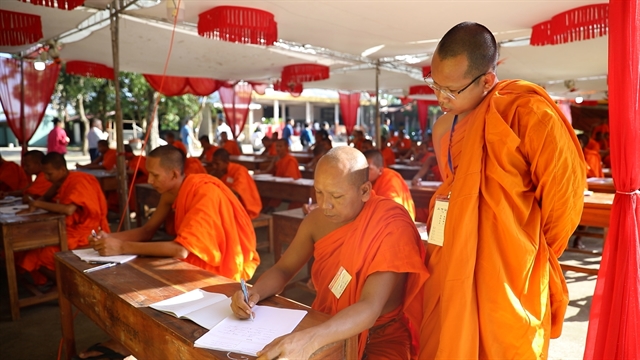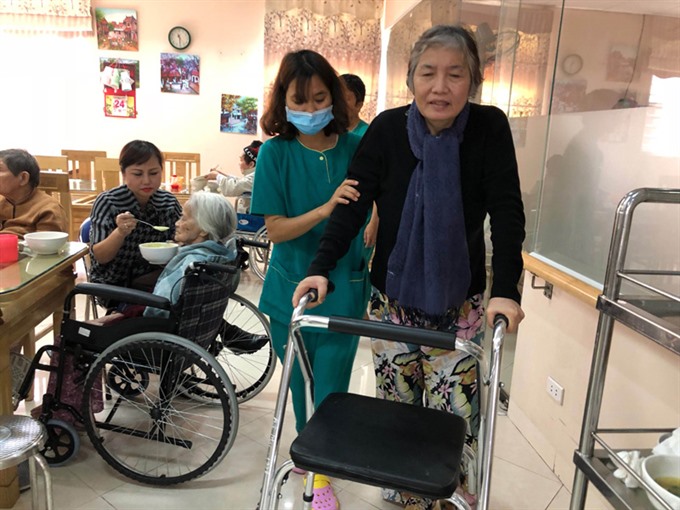 Society
Society

Many think those who send their parents to nursing homes are selfish and have forgotten those who loved and nurtured them as a child.
 |
| Old people is cared for at Diên Hồng nursing home in Yên Nghĩa Ward, Hà Nội’s Hà Đông District. - Photo hanoimoi.com.vn |
HÀ NỘI – Nguyễn Thị M (not her real name) made the difficult decision to take her mother to a Hà Nội nursing home five months ago.
She suffered a stroke a few years ago and can’t walk. To make matters worse, M’s husband is also sick, so she can’t take care of her mother.
M’s mother is one of an increasing number of retirees in Việt Nam spending their final years in nursing homes, but there are concerns the country doesn’t have enough cheap nursing homes to meet demand.
"We can’t stay at home to look after her or rely on house workers to take care of her, so the nursing home is our best choice,” M told Hà Nội Mới (New Hà Nội) newspaper.
Similarly, Nguyễn Trung Văn from Hoàng Mai District, took his father to a local nursing home about two years ago.
He said, at first, many people in his family and neighbourers opposed the decision, but he was afraid of leaving his father home alone.
"I think taking a parent to a nursing home to get good care and joyfulness is good. It does not mean I lack responsibility for my parent. People should not be prejudiced against nursing homes and should be more open-minded,” Văn said.
In Viet Nam, the concept of filial piety, or taking care of one’s parents, is taken very seriously. Many think those who send their parents to nursing homes are selfish and have forgotten those who loved and nurtured them as a child.
In many families, a married couple has to live with one partner’s parents.
Diên Hồng, a nursing home in Hà Đông District takes care of about 70 elderly people.
Due to increasing demand, the centre opened another location in July, said Hoàng Thị Thu Ngân, deputy director of the home.
According to Ngân, there are three old groups of old people who need nursing homes.
The first is the elderly with children settled abroad or work away.
The second group includes people who still live with their family but want to live in a home to spend time with people of the same age.
Finally, the elderly with chronic illness, weak health and in need of constant support also need nursing home care.
The demand for nursing homes or elderly care centres is increasing but it is not easy to operate a centre effectively, according to Ngân.
In addition to the large investment, nursing homes face difficulties in human resources.
Each elderly person usually has at least one or two chronic illnesses, so the work of a nurse is very hard and finding qualified candidates is a challenge.
Lưu Thị Hường, head of Elderly Care Department, Việt Nam Central Elderly Association, said that in modern society, the elderly could easily feel lonely. "As a result, more and more people want to live in nursing homes to improve the quality of life in their later years."
There are more than 400 nursing homes across the country, half of which receive support from the Government, with the other half privately-owned.
There are three State-supported nursing homes in Hà Nội but all lack rehabilitation equipment, proper infrastructure and human resources, with one care worker per 10 elderly.
Private nursing homes can provide good services but not many people can access these facilities due to high fees, from VNĐ6 to VNĐ9 million (US$260 to $391) per month.
Hường said that the Government should help tackle these problems.
Tạ Quang Huy, director of Hà Nội Population and Family Planning Department, said it was necessary to study elderly care by day, which many countries have implemented.
With this model, elderly people go to a nursing home in the day and go home for dinner with their family. They still live with their children, but at the same time, they do not feel lonely when their family’s members go to work and school.
At the nursing home, they have friends to talk to and nurses to take care of them and can join activities good for their mental and physical health, according to Huy.
Việt Nam’s population officially entered the aging phase since 2011 and now has more than 11 million elderly people (about 11 per cent of the total population).
It is estimated that the number of elderly people will account for 17 per cent of the population by 2030 and a quarter by 2050, the newspaper reports. - VNS